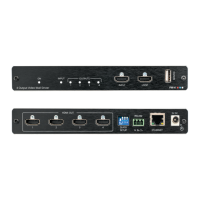Set machine number.
Some devices do not
set the new machine
number until the device is
restarted.
Some devices can
change the machine
number only from DIP-
switches.
COMMAND
#MACH-NUMmachine_id<CR>
FEEDBACK
~nn@MACH-NUMmachine_id<CR><LF>
machine_id – New device machine
number
Set machine number:
#MACH-NUM1<CR>
Get device model.
This command
identifies equipment
connected to VW-4 and
notifies of identity
changes to the connected
equipment. The Matrix
saves this data in memory
to answer REMOTE-INFO
requests.
COMMAND
#MODEL?<CR>
FEEDBACK
~nn@MODELmodel_name<CR><LF>
model_name – String of up to 19
printable ASCII chars
Get the device model:
#MODEL?<CR>
COMMAND
#MUTEout_index,mute_mode<CR>
FEEDBACK
~nn@MUTEout_index,mute_mode<CR><LF>
out_index – 0
mute_mode – On/Off
0 – Off
1 – On
Set Output 1 to mute:
#MUTE1,1<CR>
COMMAND
#MUTE?out_index<CR>
FEEDBACK
~nn@MUTEout_index,mute_mode<CR><LF>
out_index – 0
mute_mode – On/Off
0 – Off
1 – On
Get mute status of output 1
#MUTE1?<CR>
Set machine (DNS)
name.
The machine name is
not the same as the
model name. The
machine name is used to
identify a specific
machine or a network in
use (with DNS feature
on).
COMMAND
#NAMEmachine_name<CR>
FEEDBACK
~nn@NAMEmachine_name<CR><LF>
machine_name – String of up to 15
alpha-numeric chars (can include
hyphen, not at the beginning or end)
Set the DNS name of the
device to room-442:
#NAMEroom-442<CR>
Get machine (DNS)
name.
The machine name is
not the same as the
model name. The
machine name is used to
identify a specific
machine or a network in
use (with DNS feature
on).
COMMAND
#NAME?<CR>
FEEDBACK
~nn@NAMEmachine_name<CR><LF>
machine_name – String of up to 15
alpha-numeric chars (can include
hyphen, not at the beginning or end)
Get the DNS name of the
device:
#NAME?<CR>
Set DHCP mode.
Only 1 is relevant for
the mode value. To
disable DHCP, the user
must configure a static IP
address for the device.
Connecting Ethernet to
devices with DHCP may
take more time in some
networks.
To connect with a
randomly assigned IP by
DHCP, specify the device
DNS name (if available)
using the NAME
command. You can also
get an assigned IP by
direct connection to USB
or RS-232 protocol port, if
available.
For proper settings
consult your network
administrator.
For Backward
compatibility, the id
parameter can be
omitted. In this case, the
Network ID, by default, is
0, which is the Ethernet
control port.
COMMAND
#NET-DHCPnetw_id,dhcp_state<CR>
FEEDBACK
~nn@NET-DHCPnetw_id,dhcp_state<CR><LF>
netw_id – Network ID–the device
network interface (if there are more
than one). Counting is 0 based,
meaning the control port is ‘0’,
additional ports are 1,2,3….
dhcp_state –
1 – Try to use DHCP. (If
unavailable, use the IP address
set by the factory or the net-ip
command).
Enable DHCP mode for port 1,
if available:
#NET-DHCP1,1<CR>

